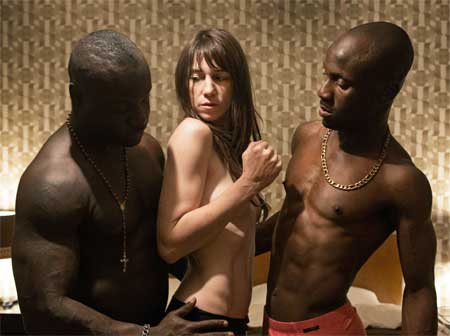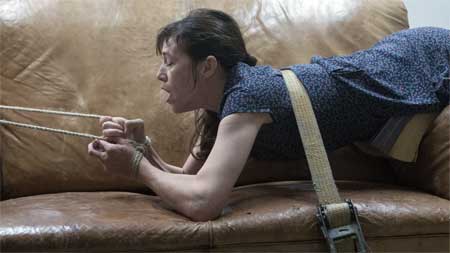Film (2013)
Written and directed by Lars von Trier
Cinematography by Manuel Alberto Claro
Film Editing by Molly Marlene Stensgaard
With Charlotte Gainsbourg (Joe), Stellan Skarsgård (Seligman), Stacy Martin (Young Joe), Shia LaBeouf (Jerôme), Jamie Bell (K), Willem Dafoe (L), Mia Goth (P)

Arizona State University Art Museum
Whatever was exuberant and gutsy in the first half of Nymph()maniac turns particularly bleak and oppressive in the second half. The young Joe, played mischievously and passionately by Stacy Martin in Volume I, now becomes older, and Charlotte Gainsbourg, who had mostly served to narrate Volume I, takes center stage. It is a dark presentation, governed less by sexual frolic than by sadomasochism, and the revelations in interviews with Seligman (Stellan Skarsgård) take on a particularly dour tone.

in “Nymph()maniac, Volume II”
Photo: Christian Geisnaes
Courtesy of Magnolia Pictures
As much as I found Volume I passionately ambitious and oddly inventive, I found Volume II depressing and narratively disappointing. Disappointment, actually, is a mild term to describe the letdown I felt in von Trier’s story line. The denouement, rather than offering a kind of visionary uplift, is exactly what I had feared it might turn out to be, and it is indeed cynical, fatalistic and mean. Somehow the smallness of that ending made me think about von Trier’s authorial and directorial motivations, with the bizarre comments at Cannes in 2011 (see the review of Nymph()maniac Volume I) resurfacing in the mix of concerns.
Much of this second film is about oppression, suffering and the extraction of a passionate response through a calloused wall of insensitivity. It does, indeed, portray that addictive quality quite well, and there is something compelling about the self-destructiveness of the protagonist through much of this second film.
But there is also something ridiculous that evolves, and what turns out to be the penultimate scene is almost as improbable as the final one. I give the final scene credit for providing the most brutally disheartening narrative outcome I have encountered in quite a long time. Given the depicted developments of character it does not play convincingly, which makes the disappointments manifold.
Mia Goth (interesting name!), as Joe’s protege, P, has an even better shot at inadvertent sexuality with a sheen of innocence than Stacy Martin’s Young Joe did in Volume I. Martin has a luminosity and intensity that carries the first part. Goth has a kid you never would expect to be into this quality, which gives it extra surprise, but also surprisingly little of the sensuality conveyed by Martin’s Young Joe.
Despite the vulnerabilities of the writing, Shia LeBoeuf does a reasonable job as a somewhat older Jerôme in Volume II. His anguished lines describe a cross- section of passion, expectation and disappointment, and, as the film progresses, that emotional lamination hardens. But there is little reason, given where he’s been, why he should follow the path von Trier describes for him in this second part of the epic.

in “Nymph()maniac, Volume II”
Photo: Christian Geisnaes
Courtesy of Magnolia Pictures
Jamie Bell as K, a professional sadist-for-hire, executes his severity with cool precision; he’s really creepy.
Charlotte Gainsbourg is quite convincing throughout, but the vulnerabilities of the story-line as it drives to its end fail to support the dismally complex picture depicted through the preceding four hours – the writing, rather than Gainsbourg’s acting, at issue.
Though Volume I has some pretensions that I could do without, it has a kind of gutsy urgency that comes through clearly. It exhibits von Trier’s real capacity to communicate the mentality that drives an obsessive and unruly exploration of passion.
In the final turns of Volume II, Von Trier falls back on startling, but improbable, turns of plot and character to create effects which seem dramatically expedient rather than effective, insufficient as narrative devices, and grimly disappointing in multiple ways.

– BADMan
Leave a Reply